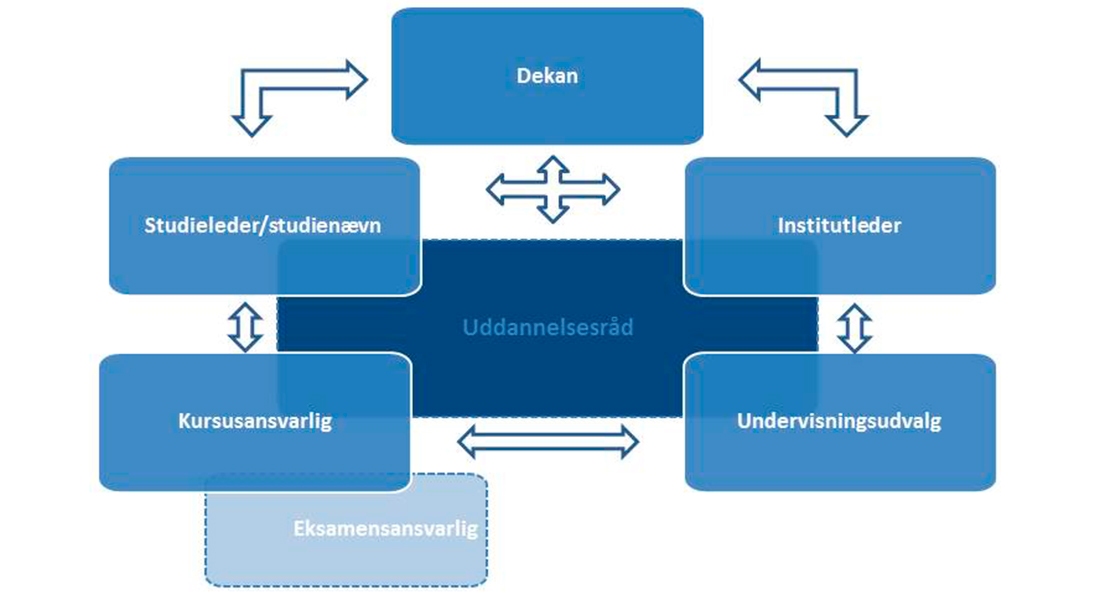Councils, boards and committees
The Dean is the senior officer at the faculty and has the overall responsibility for the quality assurance of the faculty's study programmes. The Faculty of Health and Medical Sciences has a number of boards, councils, committees and managers who advise the Dean in connection with the work to ensure teaching, study programmes and quality of education.
Below, you can read more about some of the councils, boards and committees involved in the study programmes at School of Pharmaceutical Sciences.
To ensure the participation and involvement of students and academic staff in education and teaching, the Rector has appointed a number of study boards. Each study board consists of an equal number of representatives of the academic staff and the students.
The study boards work continuously and systematically to develop and adjust the study programmes in relation to the development in research and the labour market demands. The overall responsibility for education at the faculty lies with the study boards.
The Study Board for the Pharmaceutical Sciences (in Danish) covers Bachelor’s and Master's degree programme in Pharmacy, Master's degree program in Pharmaceutical Science and MSc in Pharmaceutical Sciences and the MSc in Medicinal Chemistry.
The Masters Study Board cover the international masters educations at Faculty of Health and Medical Sciences, amongst these Master of Industrial Drug Development (MIND) and Master of Medicines Regulatory Affairs (MRA).
Faculty of Health and Medical Sciences has set up a number of committees for the purpose of providing guidance and development of the faculty's PhD programs. One of these committees is the PhD study board.
The Educational council for Pharmaceutical Sciences aims to coordinate, profile and market the school's study programmes for students and prospective students. The Educational Council processes and coordinates educational issues, taking into account strategic, educational and resource considerations. The Educational councils are advisory and ensure mutual communication between heads of department, heads of studies, chairs of study boards, course organisers, exam organisers and students. It works as a dialogue forum and is a broad resource base for the educational work. This ensures a sharing of knowledge all over. The Educational Council develop strategies for the area and guidelines for educational programme budgets.

The Educational Council is composed of Heads of Studies/The study board's Presidencies, heads of department, didactics and student representatives with the School Director as chairman.
The Education Council at PharmaSchool collaborates with the other schools and study areas at the Faculty of Health and Medical Sciences and the University of Copenhagen on the development of the study programmes, teaching and study environment, as well as quality assurance, evaluation and other relevant areas.
For more information, see the Education Council for School of Pharmaceutical Sciences's page on KU-net (DANISH and requires login).
The Advisory boards at the Faculty of Health and Medical Sciences are established with the aim of creating ongoing dialogue about the faculty's study programmes with representatives of companies, organisations and authorities who are to recruit our graduates. The members of each advisory board are external and represents the labour market in which the faculty's various graduates are to work. The advisory boards meet with the study boards and other representatives of the faculty at least twice a year to discuss study plans/curricula, qualification profiles for graduates, etc.
At SUND, a number of advisory boards have been set up, including
In the exams in which the curriculum require external examiners, the external assessment is performed by censors appointed by the Ministry of Higher Education and Science (Ministry of Education). All the study programmes are associated with a Censor Corps chaired by an external examiner.
Each corps of external examiners has a secretariat located at one of the universities that offer the study programme (s) which the Censor Corps covers.
The pharmaceutical study programmes in Denmark (domiciled at the University of Copenhagen and at the University of Southern Denmark in Odense) have a joint external examiner corps, the Censor Corps for the Pharmaceutical Educations in Denmark.
Read more on the Censor Corp's website (DANISH).
